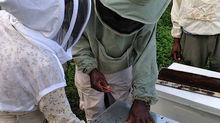Guest Opinion: Please don't kill bees
- By Kristina Lefever and Bee City USA-Ashland
- Apr 15, 2016
- 3 min read
We were saddened to hear of the bee incident this past Monday right here in downtown Ashland. First someone vandalized a hive box that was set up to capture a honey bee swarm, and then somehow the remaining bees were sprayed with pesticide. It was a large honey bee kill, and will definitely affect the population of honey bees in the area this spring.
Ashland is a Bee City USA. With that designation, the city has agreed to promote and support healthy, sustainable habitats for bees (native and honey) and other pollinators.
The city recognizes the myriad benefits that bees and other pollinators provide, with the primary benefit that they pollinate almost 85 percent of the flowering plants that we see around us, including our food crops. Without bees and other pollinators, we would lose more than half of our diet — think of the fruits and vegetables we eat every day, as well as milk and meat. Alfalfa, a common feed for livestock, is pollinated in part by alfalfa bees. Even the trees and shrubs growing in our watershed would have a reduced chance of reproducing without our native bees.
The Rogue Valley is known for its agricultural production. Our farmers depend on pollinators for their livelihood, as do beekeepers and others who earn income through the sale of bee products, beekeeping equipment and supplies, and of course, honey.
Ironically, Bee City USA had just published an article about swarms in last month’s City Source newsletter. The goal of the article was to encourage people to view a honey bee swarm as both a wondrous and necessary event — its a phenomenon that has been happening for eons, and still happens thousands of times every spring. Here is an excerpt from the City Source article:
“A growing beehive divides and sends half of its colony with the old queen to seek a new home. Before leaving the hive, worker bees fill their honey stomachs for the journey. With their full abdomens, swarming bees are unlikely to sting — their focus is on finding a new home and protecting their queen. Unprotected, a bee swarm is exposed to rain, cold, and predators, and may not survive more than three days. If you see a swarm or a colony that needs a new home, please report it immediately by calling one of the numbers listed below. You will be helping to sustain one of the world’s most fascinating and beneficial creatures."
1. Southern OR Beekeepers Association:
541-462-1604 or www.southernoregonbeekeepers.org/report-a-swarm
2. Bee Rescue Team, College of the Melissae: 360-531-3017
3. Southern Oregon University Beekeeping Club: 541-244-0391
4. Ashland Police Department Dispatch: 541-770-4784
We recognize that there is often confusion about the many flying insects with yellow and black stripes. Yellow jackets and other wasps are not bees, and should be approached with extreme caution, and perhaps eradicated if they are in the proximity of people and livestock. But honey and native bees do not attack, and will sting only in self-defense.
So if someone sees a lot of flying insects and is unable to identify them, call the swarm list. The people on the list are qualified to identify the insect and then deal with it as needed — they respond immediately, and there is no charge.
We need our bees, honey and native alike. Please don’t kill them.
Kristina Lefever is chairwoman of Bee City USA-Ashland, which joins in this opinion.




































Comments